| |
The Fourth Session of China Arbitration Forum Held at BAC
The 4TH session of China Arbitration Forum co-sponsored by BAC and School of Law of Tsinghua University was held at BAC on October 9, 2010 to commemorate the 15th anniversary of enforcement of Arbitration Law. The two topics for this session are respectively “Finance and taxation under the system of self-controlled revenue and expenditure” and “Arbitrators management system and their professional integrity”. Attendants at the meeting include arbitration commission representatives from CIETAC, Shanghai Arbitration Commission, Guangzhou Arbitration Commission, Shenzhen Arbitration Commission, Changsha Arbitration Commission and experts and scholars from Tsinghua University, Peaking University, China University of Political Science and Law, China Foreign Affairs University, and Wuhan University.
Professor Liang Huixing, chairman of China Arbitration Forum, addressed the meeting. Mr. Liang stated that evolution of commercial arbitration, emerging upon the transition from planned economy system to market economy system, is subject to the development of market economy system. Reform of arbitration system should be a continuous process, and we still have a long way to go. However, further studies are yet to be done as to arbitrators’ professional integrity cultivation and management system of arbitration commission itself because the two aspects relate to credibility of arbitration. Professor Che Pizhao, secretary of the Party committee of School of Law of Tsinghua University gave a speech on behalf of School of Law of Tsinghua University as a sponsor, and expressed his hope for a successful meeting.
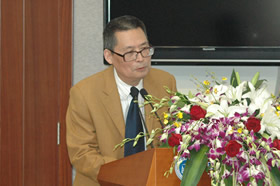 |
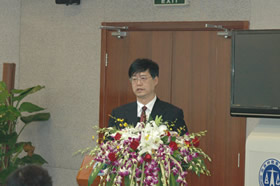 |
Professor Liang Huixing giving speech |
Professor Che Pizhao giving speech |
Professor Han Shiyuan from School of Law of Tsinghua University presided over the discussion on “Finance and taxation under the system of self-controlled revenue and expenditure”, and Secretary General Wang Hongsong, Leng Haidong, Deputy Secretary General of CIETAC, and deputy professor Cui Wei from CUPL made speeches respectively titled “On taxation policy for arbitration commission”, “Issues concerning reform of commercial arbitration”, and “On taxation policy toward arbitration commissions”. In her speech, Secretary General Wang Hongsong stated that the comments of Finance Ministry on the proposal (No. 6049) dated June 25, 2010 and at third session of 11th National People’s Congress served for an active, positive, and constructive response to the proposal submitted by NPC members and problems with financial management system, which have been hindering the development of China's arbitration commissions. However, if arbitration fee is to be charged as service fees of commercial nature, revenue of arbitration commission after taxation will not be sufficient for normal running and furthering of arbitration reform. This not only makes no contribution to the forming and evolution of a diversified dispute settlement mechanism but also fundamentally goes against the benefit and interest of parties concerned. Mrs. Wang stressed now that as we know it will be necessarily a gradual process for arbitration commissions being administrative institutes to change into competitor in market, and that some arbitration commissions not qualified to self-controlled revenue and expenditure system are allowed to take administrative subsidiary 15 years even unlimited years after the enforcement of Arbitration Law, why not make preferential taxation policy available for arbitration commissions that have adopted self-controlled revenue and expenditure system for the same period? The latter practice is to encourage arbitration commissions to evolve under the guidance of Arbitration law given reducing financial expenditure. Therefore, the latter is much better than the former in respect of the benign demonstrative effect and the significance to arbitration reform. She suggested preferential taxation policy be made available by Finance Ministry with reference to nature of arbitration commissions as well as their functional contribution to social and economic development. Leng Haidong, Deputy Secretary General of CIETAC, probed into the problems emerging upon reform of commercial arbitration from five aspects. Deputy professor Cui Wei also analyzed the probability of applying corporate income tax and turnover tax to arbitration commissions and stressed key factors to be considered in making policy.
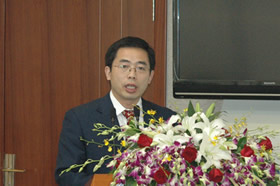 |
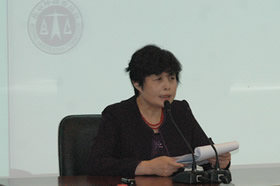 |
Professor Han Shiyuan, the presider |
Secretary General Wang Hongsong addressing the meeting |
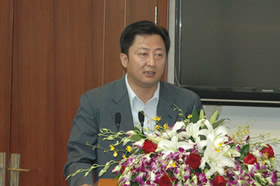 |
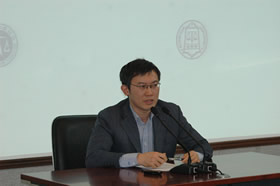 |
Leng Haidong, Deputy Secretary General of BAC addressing the meeting |
Deputy professor Cui Wei |
The discussion on "Arbitrators management system and their professional integrity" was presided over by professor Song Lianbin from Wuhan University, and lawyer Mr. Zhang Jie, professor Fu Yulin, and deputy professor Deng Feng made a speech respectively titled "Build up honest and clean arbitrators team", "Development and self-positioning of arbitrators", and "A historical view on arbitration system and arbitrators' professional integrity".
Professor Liang Huixing ended the discussion with a summary. Mr. Liang said, the two topics for this session are very appropriate. One is about external environment for arbitration commissions, i.e. how arbitration commissions are to be managed at national level. It is not appropriate to treat arbitration fees as administrative and institutional fees, but whether or not taking it as service fees of commercial nature is yet to be proved not only in practice but also in theory. When ten persons are asked what "profitable", "public benefit", and "non-profitable" stands for, there should be ten different answers. This relates to what tax policy should be applied to arbitration commissions. Everyone in arbitration circle should express his or her opinions on this topic and take initiative to contend for policies favorable to development of arbitration commission. The discussion at the meeting is just a beginning, and further studies in these topics should be done. However, arbitrators cultivation is a matter of arbitration commission itself, or how arbitration commission to establish its credibility. All opinions presented are very appropriate. We should from now on strive to maintain arbitration credibility instead of doing this when we have lost it. Arbitration circle should take initiative to formulate ethical norms for arbitrators.
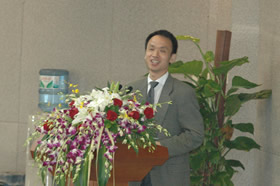 |
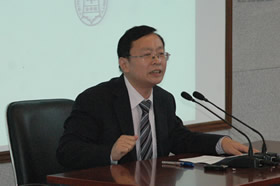 |
Professor Song Lianbin, the presider |
Lawyer Zhang Jie addressing the meeting |
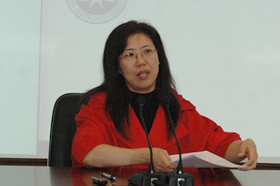 |
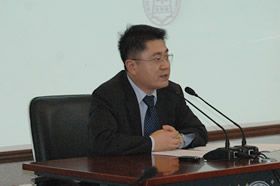 |
Deputy professor Fu Yulin making speech |
Deputy professor Deng Feng making speech |
Free talks in afternoon on "Internal finance management" and "Highlights in arbitration practice" were held at international conference hall and the first arbitration hall of BAC. Secretary Generals and Directors from some 20 arbitration commissions introduced the actual problems and challenges encountered, and exchanged experience in arbitrator management. After the meeting, arbitrators presented looked around the offices and arbitration hall of BAC under Secretary General Wang Hongsong’s accompany, meanwhile, representatives had broad and extensive exchanges in service field and arbitration commission management etc.
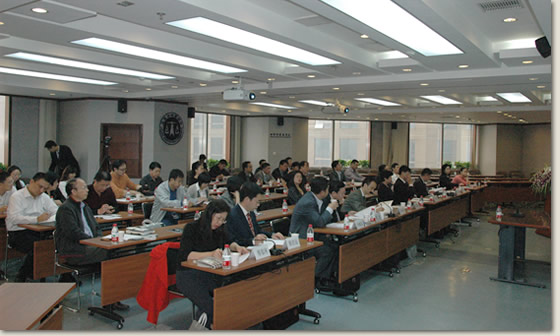 |
The meeting scene |
It is said that China Arbitration Forum was originally advocated by Professor Liang Huixing, a distinguished civil and commercial law scholar. This symposium dedicated in arbitration development is co-organized by well-known domestic universities and influential arbitration commissions. The past three session of China Arbitration Forum were held in Hunan province in respectively 2006, 2007, and 2008, with a series of realistic highlights topics covered, such as nature of arbitration commisssions, structural reform of arbitration commission, finance management system characterized by two lines of revenue and expenditure, and judicial review of arbitration award. Each session of China Arbitration Forum attracted a great many of arbitration commssion representatives, arbitrators, professors and college students, as well as experts and scholars from law and trade circle, who care about China’s arbitration development. Achievement of such meetings contributed a great deal to China's arbitration system reform and development of arbitration commissions. This year, it is the first time for China Arbitration Forum being held in Beijing.
Appendix: Text of speech on “Taxation for Arbitration Commissions” by Secretary General Wang Hongsong (http://www.bjac.org.cn/news/view.asp?id=1844)
|